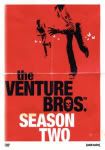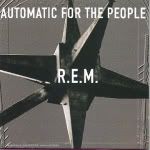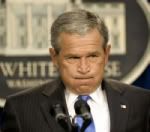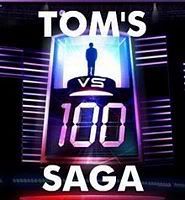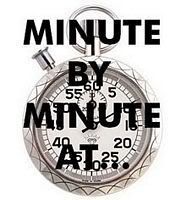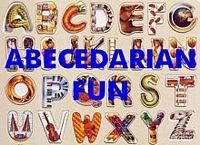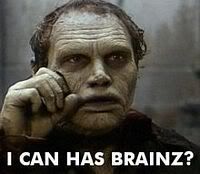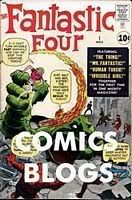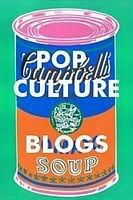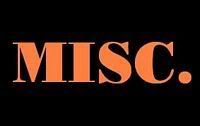MOVIES: Land of the Dead
I finally got out to see Land of the Dead today, and I was pretty well pleased with it. It wasn't quite as epic, as landmark, as pointedly, wickedly satirical a film as I had hoped (although it hit a few good targets, targets which Dennis Hopper's "We do not negotiate with terrorists" line makes fairly obvious), but it was great fun, with truly copious amounts of gore.
Simon Baker was decent as the lead, but he's pretty bland; about the best I can say of his performance is that he's inoffensive. Asia Argento was inspired casting, a tribute to George Romero's fellow zombie film creator, Asia's father Dario Argento; she's convincingly tough, and effortlessly sexy. John Leguizamo was dynamic as a soldier trying to work his way into the upper ranks, and discovering that even though the world has been split into two basic groups, the living and the dead, there are still those among the living who see him as less than themselves -- as less than human, perhaps. And Dennis Hopper (as the high man on the pole) -- come on! He's Dennis fucking Hopper. He's deliciously evil: more soulless than the undead, concerned with nothing more than accumulating and maintaining his power, sneeringly lording it over those he considers his inferior, which is pretty much everyone. (His personal attendant, a black man dressed up and made to perform in a blatantly, stereotypically subservient fashion, straight out of the Stepin Fetchit era, is especially discomfiting to watch and damning of Hopper's character.) His repeated use of the line, "You have no right!" clearly illustrates his belief that only he has any rights. But I tell you what, to hear Hopper utter the line, "Zombies, man! They creep me out!" -- that was heavenly. That was transcendent. That helped me find my bliss, brothers and sisters.
But the movie is pretty well stolen by Eugene Clark as Big Daddy (that's the name on his gas station attendant uniform, anyway), the leader of the zombies. His lines consist of snarls and howls, but he's still the most compelling performer on the screen. Big Daddy is learning and adapting, organizing his people, teaching them skills, and finally leading them in an assault against the people who have oppressed and hunted and slaughtered them. The parallels to the Iraq war are often blunt, but the players are hard to define. Are the zombies the equivalent of the Iraqi guerrillas versus the U.S. troops? Or are they rising up against their own personal Saddam? There's no mistaking that Big Daddy, despite being a vicious undead killing machine, is often the most sympathetic character in the film. Perhaps my favorite scene is Big Daddy's discovery that the living soldiers have captured and strung up dozens of zombies by the feet, and wrapped them in paper targets for shooting practice. Who is more inhuman?
But forget all that social commentary crap. What about the gore? It's good and plentiful, my friends. It's hard to do something new with zombies these days, what with the recent glut of zombie pictures, but Romero pulls out some neat tricks. The headless zombie -- I won't say more, but you'll know which one I mean -- that was tremendous, clever and surprising and scary.
And the eating, oh, the eating! I can not believe how much they got away with here. Guts torn from still living humans and devoured, hands and arms torn in two like wishbones, heads torn from bodies, more severed limbs than you can shake a... a severed limb at! Strangely, though, the gore is often less disturbing than in Romero's earlier films, when the effects were less advanced, and the blood looked like red paint. There's a big-money sheen on the picture that somehow eliminates some of the visceral power of the earlier, cheaper, down and dirty films. And the scares are also overshadowed by the gore; there's less a sense of fear and dread, and much more emphasis on the gory aftermath.
But I appreciated how much of the special effects were man-made as opposed to digitally created. Sometimes the CGI stuff works, truly amazes and enhances the film experience (like in the first Matrix), but 99 times out of 100, I'd rather see hand-crafted, physically solid makeup effects than computer trickery. You can do a lot more with computers than you can with latex appliances and Karo syrup -- but it's a hundred times more satisfying knowing you're looking at something real.
The performances of Clark, Hopper, and Leguizamo help elevate the film above many of the more recent zombie features, as does the politically-aware (though frequently subtle as a bludgeon) story. (With the caveat that the actual dialogue rarely supersedes merely utilitarian, plot-advancing verbiage; only Hopper and Leguizamo bring any real life to the words -- it helps that they get the best words to say.) It's not the best of Romero's zombie oeuvre; in fact, it may be the fourth best out of four. But it's still better than about 99% of the horror films released in the two decades (!) since Day of the Dead. It may not be an instant classic, but it's a worthy addition to the horror genre, and a great return for Romero.



